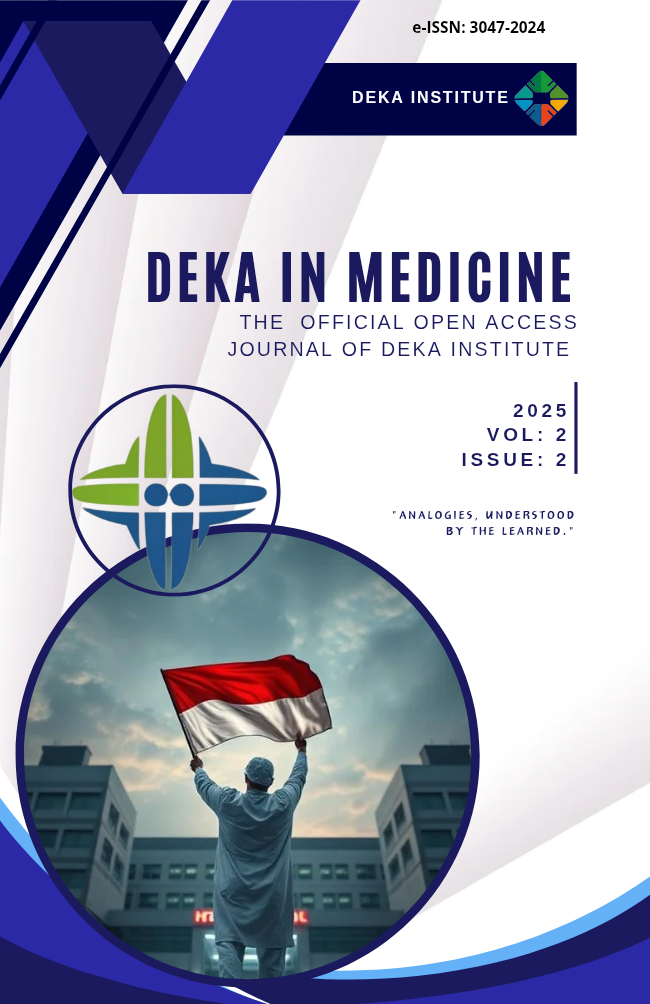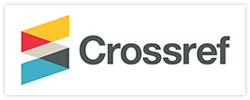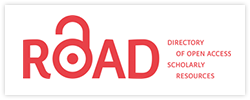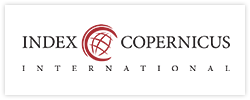
Policies
1. Peer Review Process
All manuscripts submitted to Deka in Medicine will be subject to a rigorous screening and assessment procedure to determine their conformity with the journal's focus and their scholarly merit and originality within the discipline. Our journal employs a double-blind peer review mechanism to maintain anonymity between authors and reviewers. The following outlines the progression of this process:
- Initial evaluation: Upon submission, a newly received manuscript will be assessed by the Assistant Editor to confirm compliance with fundamental submission requirements, and by one of the Editor-in-Chiefs to determine its congruence with the scope of Deka in Medicine. Manuscripts that do not meet these initial criteria will be declined without undergoing further review.
- Peer review: After the initial screening process is successfully completed, the manuscript will be allocated to a handling editor, who will then distribute it to at least two experts in the relevant field for a double-blind peer review.
- First decision: A peer-reviewed manuscript will only receive a decision after obtaining a minimum of two review reports. At this point, the manuscript may be rejected, asked for revisions (major or minor), or accepted. If accepted, the manuscript will be sent back to the submitting author for formatting. The final decision to accept the manuscript will be made by the Editor-in-Chief, based on the handling editor's recommendation.
- Revision phase: A manuscript requiring revisions will be sent back to the submitting author, who will be given a maximum of three weeks to revise and format it. Following this, the revised manuscript will undergo evaluation by the handling editor. The handling editor will evaluate the adequacy and suitability of the revisions, as well as the responsiveness of the author(s) to the reviewers' feedback. If the revisions are considered inadequate, the process will be repeated, with the manuscript returned to the submitting author for further revision.
All peer-reviewed and published manuscripts are made openly available under CC BY-SA 4.0, ensuring that the process not only guarantees quality but also supports free and open reuse of scholarly works.
Our journal is fully committed to implementing international publication ethics standards, including COPE, the DOAJ Best Practice Principles, and Scopus editorial guidelines. This policy clearly affirms the principles of editorial independence, mechanisms for managing conflicts of interest, and ethical oversight. In addition, we ensure that every published article meets high scientific quality standards through a transparent and accountable editorial and peer-review process.
2. Plagiarism and Data Fabrication
Any form of plagiarism is viewed as unethical behavior in publishing and will not be accepted. Plagiarism is defined as the reproduction of text, ideas, images, or data from any source, including one's own previous work, without proper acknowledgment of the original sources. To ensure originality, all submitted manuscripts are screened using plagiarism detection software, particularly Turnitin. Manuscripts with a similarity index exceeding 19% may be subject to rejection.
Maintaining data integrity is crucial in scientific research, emphasizing the importance of presenting original data free from inappropriate practices like selective exclusion, manipulation, enhancement, or fabrication. These practices include actions such as excluding data points to artificially enhance significance, fabricating data, selectively choosing results to support a particular conclusion while disregarding contradictory data, and biasing the choice of analysis tools or methods (including p-hacking) to achieve a desired outcome. To enhance transparency and rigor, it is highly advised that methods and analyses be preregistered.
3. Open Access Information and Policy
Every article published in Deka in Medicine undergoes stringent peer review and is immediately available worldwide under an open-access license, without any delay. Articles in our journal are published under the Creative Commons Attribution-ShareAlike 4.0 International License (CC BY-SA 4.0). This open content license allows creators to share their work while enabling others to freely use, modify, and distribute it under certain conditions.
4. Article Processing Charges
Deka in Medicine functions as a fully open-access journal with no associated costs. Readers do not encounter subscription fees, and authors are not charged for page or figure inclusion. The journal covers expenses related to peer review administration, technical editing, typesetting, professional article production, website maintenance, assigning Digital Object Identifiers (DOIs) for each article, and other publishing tasks, without requiring payment from authors. Therefore, no article processing charges (APCs) are applied for the submission of accepted articles [No Submission Fee]. Moreover, items such as Corrections, Erratum, and Retractions are published without charge. The Deka Institute covers the expenses associated with facilitating open access to the articles.
5. Authorship and Changes to Authorship
Authors are required to have made significant contributions to each of the following aspects:
- The conceptualization and design of the study, acquisition of data, or analysis and interpretation of data.
- Drafting the manuscript or critically revising it for significant intellectual content.
- Giving final approval of the version to be submitted. Authors are required to meticulously review the list and order of authors before submitting their manuscript, ensuring accuracy and completeness.
Authorship list modifications, such as additions, deletions, or rearrangements, are permissible only before the manuscript's acceptance and with the endorsement of the journal Editor. To initiate such changes, the corresponding author must provide the Editor with: (1) a rationale for the alterations in the author list and (2) written confirmation (via email or letter) from all authors, indicating their concurrence with the proposed addition, removal, or rearrangement. In instances of author addition or removal, confirmation from the respective author is also obligatory. The Editor will only consider authorship changes after manuscript acceptance in exceptional circumstances. During the Editor's evaluation of the request, manuscript publication will be temporarily suspended. If the manuscript has already been published online, approved requests will lead to a corrigendum.
6. Copyright and Licensing
Authors retain copyright of their articles. All published works in Deka in Medicine are licensed under the Creative Commons Attribution-ShareAlike 4.0 International License (CC BY-SA 4.0). This means others may copy, distribute, display, perform, adapt, and build upon the work for any purpose, including commercial, provided they give appropriate credit, provide a link to the license, indicate if changes were made, and distribute derivative works under the same license terms.
7. Archiving and Repository
This journal utilizes the Lots of Copies Keep Stuff Safe (LOCKSS) system to create a distributed archiving structure among participating libraries. This system grants these libraries permission to create lasting archives of the journal, which supports preservation and restoration initiatives. Because articles are published under CC BY-SA 4.0, archived versions remain freely reusable and adaptable, ensuring both preservation and ongoing accessibility of knowledge.
8. Advertising
Deka in Medicine does not provide advertising space or accept advertisements.
9. Marketing
Deka in Medicine employs targeted and data-driven promotional strategies to attract potential authors. In implementing these efforts, the journal emphasizes the dissemination of precise information while refraining from practices like email spamming that could adversely affect others.
To maximize the advantages for authors who publish in our journal, we strive to achieve the following objectives:
- Improve the design of the journal website to enhance reader navigation.
- Boost the discoverability of the journal on leading search engines such as Google.
- Ensure inclusion and comprehensive coverage of content in international scientific databases.























